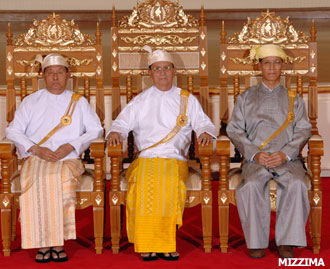Burmese Vice President Tin Aung Myint Oo, known as a strong hardliner, has submitted his resignation for health reasons, according to media reports.
 A retired four-star general, Tin Aung Myint Oo, 61, has not appeared in public recently.
A retired four-star general, Tin Aung Myint Oo, 61, has not appeared in public recently.
The report has not been confirmed by official sources.
Some observers also said that President Thein Sein might soon remove other top officials and reshuffle his cabinet offices, perhaps combining some ministries to reduce the number.
According to a broadcast report on the Burmese language service of the Voice of America on Sunday, Tin Aung Myint Oo submitted a resignation letter to the president on Thursday, citing “health reasons” after he returned from Singapore for medical treatment.
The Financial Times reported on April 20 that the vice president and President Thein Sein did not work well together, and noted Tin Aung Myint Oo’s absence from the spotlight.
Citing sources close to the government, The Financial Times said the vice president was one of several officials slated to be “moved to different roles or have their responsibilities reduced,” perhaps over fears that they could hold up the removal of more western sanctions.
Other leaders mentioned as possible casualties of a shakeup were ruling Union Solidarity and Development Party (USDP) members Aung Thaung and Htay Oo, as well as Information Minister Kyaw San and Electric power Minister Zaw Min.
Burma watchers say Tin Aung Myint Oo was considered to be one of the most corrupt of the ex-generals serving in the current administration. The appointment of his replacement could signal important changes in the power structure: if his replacement is known as a more moderate figure, it could mean the Thein Sein government believes it is not necessary to give the hardliners another powerful seat in government. The change comes after the government-backed party's humbling defeat in the by-election by the National League for Democracy.
Tin Aung Myint Oo is one of Burma’s two vice presidents and is a leader among a hardline faction that carried over from the former military junta into the year-old military-backed government of Thein Sein, who is viewed as a moderate committed to reforming the former totalitarian regime into a quasi-democratic system.
In 2009, he was appointed military adviser to longtime junta leader Than Shwe. He was elected to the Lower House a year later as a candidate for the army-backed Union Solidarity and Development Party, and was quickly nominated for vice president by military delegates.


